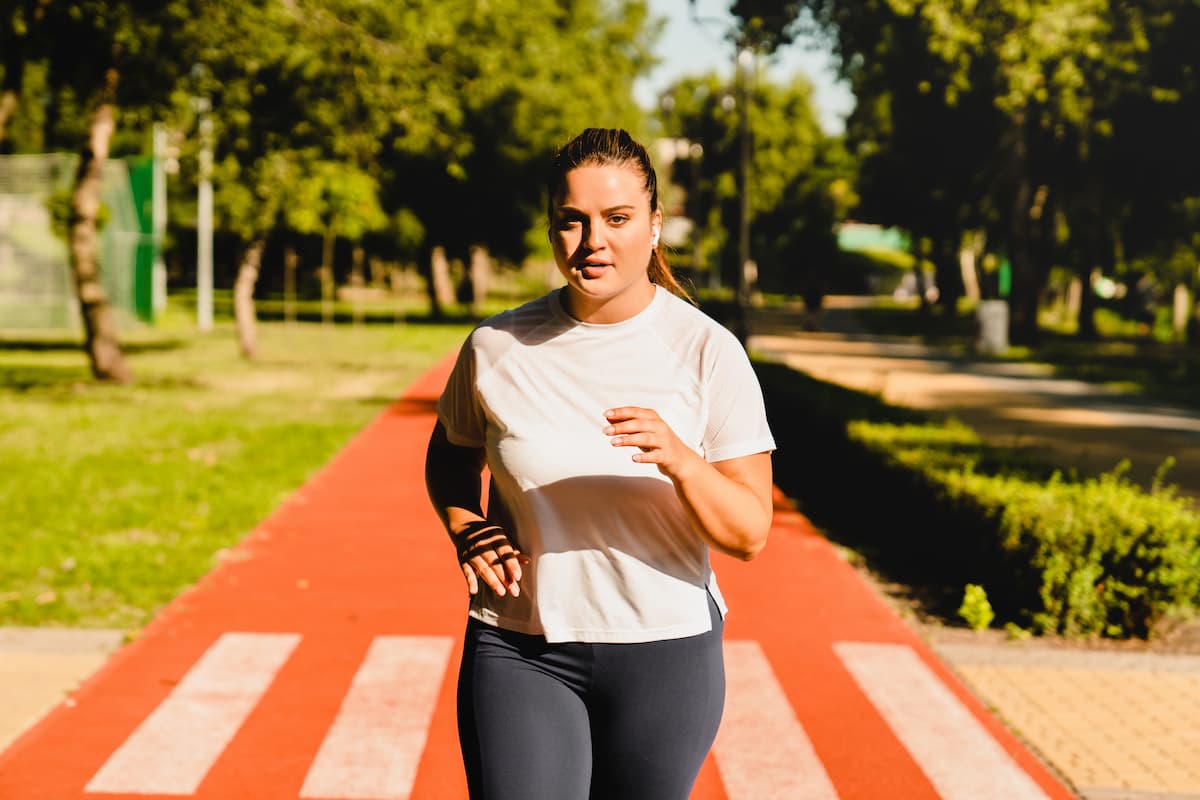Walking 5 km is a popular exercise that varies in duration depending on several factors.
This article explores how long it takes to walk 5 km (3.1 mile) and what influences this time
How long does it take to walk 5 km ?
| Speed (mph / km/h) 🚶♂️ | Time to Walk 5 km ⏱️ | Calories Burned 🔥 |
|---|---|---|
| 2.0 mph / 3.2 km/h | 1 hour 34 minutes | 175 calories |
| 2.5 mph / 4.0 km/h | 1 hour 15 minutes | 200 calories |
| 3.0 mph / 4.8 km/h | 1 hour 2 minutes | 225 calories |
| 3.5 mph / 5.6 km/h | 53 minutes | 250 calories |
| 4.0 mph / 6.4 km/h | 47 minutes | 275 calories |
| 4.5 mph / 7.2 km/h | 42 minutes | 300 calories |
| 5.0 mph / 8.0 km/h | 38 minutes | 325 calories |
This table includes estimated calorie burn rates for walking 5 km at various speeds.
Keep in mind these are rough estimates and actual calorie burn can differ based on individual body composition, exact walking pace, and other environmental factors.
In a nutshell, walking 5 kilometers typically takes around 1 hour for an average walker moving at a comfortable pace of about 5 kilometers per hour.
BUT, this time can vary based on factors like walking speed, terrain, and individual fitness level. Some people might walk faster or slower, so the actual time could be somewhat different.
Factors that can affect how long it takes to walk 5 km
Before you embark on a 5km journey, it’s essential to understand your personal walking pace.
Ranging from leisurely strolls to brisk power-walking, measuring your walking speed will give you a better understanding of how long it takes to cover a particular distance like 5 km.
Typically, an average walking speed is about 5 kilometers per hour (3.1 miles per hour).
However, this may vary depending on factors such as fitness level, terrain, and age.
To determine your walking pace, find a fixed route with known distance (like a track or measured loop), time yourself walking at a comfortable pace, and calculate your walking speed by dividing the distance by the time taken.
Having this estimated duration will help you plan accordingly when attempting any 5km walk.
The type of environment you choose to walk in will greatly influence how quickly you complete the 5 km.
Some may prefer a flat, paved surface, while others might opt for a scenic trail with varying elevation. When factoring in time, consider the obstacles that each terrain presents.
- Flat surfaces: Easiest terrain for most walkers; allows for faster, easier footsteps without any elevation hindrances.
- Hilly areas: A more strenuous workout due to the incline. Ascent on steep hills will require extra time in comparison to flatter surfaces, especially for beginners.
- Nature trails:Varied and uneven terrain can slow walking speed, anticipating potential hazards like roots and rocks is vital to avoiding injury or delays.
In addition to the type of land you’re traversing, the climate also poses a factor when estimating completion time.
Warmer weather could slow you down with dehydration and fatigue, while colder temperatures may cause your body to expend extra energy trying to keep warm.
Here are all the factors that can affect your performance :
- Age: Walking speed generally decreases with age. Younger adults tend to walk faster, but speed may decrease with each decade of life.
- Sex: Men often walk slightly faster than women, likely due to differences in leg length, muscle mass, and aerobic capacity.
- Fitness Level: Higher cardiovascular fitness allows for faster walking without fatigue.
- Body Weight and Composition: Overweight or obese individuals may use more energy to move, affecting speed, although fit individuals with larger bodies can also be fast walkers.
- Effort Level: Walking speed varies with effort. There can be significant differences in time taken to walk 5 km based on whether you are walking leisurely or at maximum effort
- Environmental Conditions: Extreme weather (rain, cold, heat) can reduce walking speed.
- Physical Limitations: Individuals with physical limitations (e.g., requiring aids like crutches or canes) generally walk slower.
- External Load: Carrying heavy loads or pushing strollers requires more effort and can decrease walking speed.
This list presents a clear and concise overview of the main factors influencing walking time for a 5 km distance.
The importance of walking technique
Your overall fitness level and experience greatly affect how long it takes to walk a 5 km.
Practicing proper posture and technique will not only prevent injuries but ultimately contribute to reaching your five-kilometer goal more efficiently.
Proper Body Alignment
Maintaining correct alignment throughout your walk will promote ease of movement and limit unnecessary strain on your joints and muscles.
Key elements to focus on include engaging core muscles, keeping chin parallel to the ground, relaxing shoulders, and maintaining an upright stance that avoids hunching or leaning backward/forward.
Effective Arm Swing
A natural swinging motion of arms is crucial during a walk. Bending elbows at approximately ninety-degrees will create an efficient momentum that effectively syncs upper and lower body movements.
Refrain from making exaggerated arm swings that can not only waste energy but can result in shoulder pain.
Pacing Your Steps
Paying attention to stride length is important as an ideal stride allows for optimal use of muscle power and conserves energy.
By timing the speed and length of steps, a beginner walker can determine if smaller or larger strides are needed to optimize the pace.
How to get your first 5 km walk done ?
Achieving manageable goals along your 5km journey is vital for continued success and enjoyment. As a novice walker, setting realistic expectations ensures you can build on your progress over time.
Consider following these general milestones:
- Begin with shorter walks consistently, eventually building endurance to cover longer distances at consistent speeds.
- Gradually increase intensity by incorporating changes in incline, terrain, or interval training into your routine.
- Aim to complete 5 km in about 45 minutes to an hour; improvements can be made with enough practice and increasing fitness levels.
In conclusion, remember that each individual progresses at varying speeds, and the time it takes to walk a 5 km will depend on numerous factors.
By understanding personal walking pace, accommodating for environmental influences, implementing proper techniques, exploring group engagement, and setting achievable milestones, you can enjoy this rewarding and healthy activity.
Frequently Asked Questions (FAQ)

What is the average time to walk 5 km for a beginner?
For a beginner, walking 5 km generally takes between 50 minutes to 1 hour and 15 minutes. This time frame depends largely on the walking speed, which is typically slower for beginners as they may not have built up endurance or speed.
A comfortable pace for most beginners is around 4 to 5 km/h (about 2.5 to 3.1 mph).
How does walking speed affect calorie burn?
The number of calories burned while walking depends on your speed, body weight, and walking efficiency.
Generally, faster walking speeds lead to a higher calorie burn. For instance, walking at a brisk pace of 5 mph (about 8 km/h) can burn significantly more calories compared to a leisurely pace of 2 mph (about 3.2 km/h).
This is because your body uses more energy to sustain a faster pace.
Can walking 5 km daily improve my health?
Yes, walking 5 km daily can significantly improve your health.
Regular walking, especially at a moderate to brisk pace, can help enhance cardiovascular fitness, strengthen bones, reduce excess body fat, and boost muscle power and endurance.
Additionally, it can reduce the risk of developing conditions such as heart disease, type 2 diabetes, osteoporosis, and some cancers.
What should I wear when walking 5 km?
Wearing the right gear is important for comfort and preventing injuries when walking long distances.
Choose comfortable, breathable clothing that suits the weather conditions.
Footwear is particularly important; wear well-fitted walking shoes with good arch support and cushioning.
Avoid new shoes that haven’t been broken in, as they could cause blisters.
How should I prepare for my first 5 km walk?
Start by ensuring you are well-hydrated and have eaten a light meal or snack high in carbohydrates about 1 to 2 hours before you start walking.
Begin with a warm-up, such as a few minutes of stretching or a gentle walk.
Plan your route beforehand, ideally choosing one that is flat and scenic to make the walk more enjoyable. Finally, pace yourself, starting slowly and increasing your pace as you feel more comfortable.
Adding these FAQs to your post not only provides valuable information that might be specifically sought by readers, but also helps in capturing a broader range of search-related terms and questions, potentially improving the SEO performance of your post.
How many steps are in 5 km?
The number of steps it takes to walk 5 km varies depending on an individual’s stride length, but on average, a person takes about 6,250 to 7,500 steps to walk 5 kilometers.
Typically, the average stride length is approximately 0.67 to 0.8 meters (about 2.2 to 2.6 feet).
You can calculate your exact steps for 5 km by measuring your stride length and then dividing 5,000 meters by your stride length in meters.
Read more : How many steps make up 10 km ?







